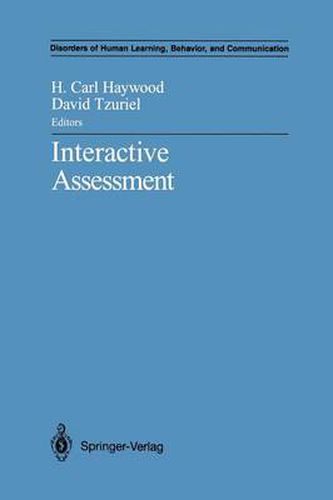Readings Newsletter
Become a Readings Member to make your shopping experience even easier.
Sign in or sign up for free!
You’re not far away from qualifying for FREE standard shipping within Australia
You’ve qualified for FREE standard shipping within Australia
The cart is loading…






This title is printed to order. This book may have been self-published. If so, we cannot guarantee the quality of the content. In the main most books will have gone through the editing process however some may not. We therefore suggest that you be aware of this before ordering this book. If in doubt check either the author or publisher’s details as we are unable to accept any returns unless they are faulty. Please contact us if you have any questions.
The terms interactive and dynamic would never have been associated with psychological and psychoeducational assessment a generation ago. They have currency now because of widespread dissatisfaction with the normative, standardized testing model, criticism of theoretical concepts of intelligence, recognition of abuses of standardized intelligence testing, and frustration with prediction and classification as primary goals of assessment. It is almost certainly true that public policy concerns propel scientific activity far more often than science propels public policy! In the case of psychological assessment, public policy concerns have arisen in the last 20 years primarily around issues of possible discrimination against members of ethnic minorities. At the same time, there has been a re surgence of dedication to excellence in education goals. These concerns have led to such extreme measures as prohibition of the use of standard ized intelligence tests to determine school placement decisions, especially for minority children. They have led also to a search for alternatives to standardized, normative testing. The chapters in this volume represent a variety of answers to this need.
$9.00 standard shipping within Australia
FREE standard shipping within Australia for orders over $100.00
Express & International shipping calculated at checkout
This title is printed to order. This book may have been self-published. If so, we cannot guarantee the quality of the content. In the main most books will have gone through the editing process however some may not. We therefore suggest that you be aware of this before ordering this book. If in doubt check either the author or publisher’s details as we are unable to accept any returns unless they are faulty. Please contact us if you have any questions.
The terms interactive and dynamic would never have been associated with psychological and psychoeducational assessment a generation ago. They have currency now because of widespread dissatisfaction with the normative, standardized testing model, criticism of theoretical concepts of intelligence, recognition of abuses of standardized intelligence testing, and frustration with prediction and classification as primary goals of assessment. It is almost certainly true that public policy concerns propel scientific activity far more often than science propels public policy! In the case of psychological assessment, public policy concerns have arisen in the last 20 years primarily around issues of possible discrimination against members of ethnic minorities. At the same time, there has been a re surgence of dedication to excellence in education goals. These concerns have led to such extreme measures as prohibition of the use of standard ized intelligence tests to determine school placement decisions, especially for minority children. They have led also to a search for alternatives to standardized, normative testing. The chapters in this volume represent a variety of answers to this need.